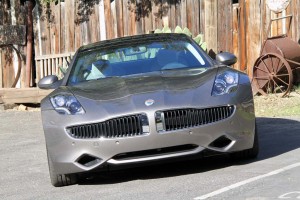Admitting it supplied the faulty pack that failed during a recent, highly publicized test of the Fisker Karma plug-in hybrid, battery maker A123 has announced the recall of lithium-ion batteries it has provided for five electric vehicle programs.
While the supplier declined to identify the other automakers impacted by the recall or the precise number of batteries, it indicated the total cost of replacing potentially defective batteries will come to $55 million.
“This is absolutely not a good time” for the recall to occur, conceded David Vieau, CEO of A123 Systems, one of the largest providers of lithium-ion batteries for automotive applications – especially as it comes only a few months after a widely reported problem with the battery pack used in the Chevrolet Volt. But Vieau insisted it is “not a widespread problem that would challenge the viability of the technology.”
The issue appears to have come to light earlier this month when a Fisker Karma plug-in was delivered to Consumer Reports magazine for testing. As TheDetroitBureau.com previously reported, the vehicle went into a so-called failsafe mode that would not allow it to be started up. The problem was later resolved and the magazine continued its testing. (For more on Consumer Reports’ test of the Fisker Karma, Click Here.)
In the wake of that problem, A123 “discovered that some prismatic cells made in our Livonia (Michigan) facility may contain a defect which can result in premature failure of a battery pack or module that includes a defective cell,” Vieau explained during a media conference call this morning.
According to A123, the defect will not cause a vehicle to suddenly stop running. But once it is stopped and put into Park it will no longer be able to start up again without repair.
The problem has been isolated to a specific machine in the Livonia plant, one of four used in the packaging of so-called prismatic lithium cells into a complete battery pack. An improper crimp can cause the batteries to short out. Only some batteries produced at the facility are impacted. They use what is known as a prismatic, or pouch-like, design, rather than the more common, cylindrical battery shape.
The batteries covered by the recall are used in five separate automotive programs, Vieau confirmed, though he declined to identify any manufacturer other than Fisker. He did note that A123 does not supply batteries to either the Nissan Leaf or Chevrolet Volt, two of the highest-profile electric vehicles now on the market.
He also declined to discuss the specific number of battery packs covered by the recall, indicating only that the total cost to the company for the recall will be about $55 million.
“We’re going to weather this,” the CEO said during his conference call, but he conceded it will be seen as another black mark for the nascent battery car market.
Sales of hybrids, plug-ins and pure battery-electric vehicles, or BEVs, have been running significantly more slowly than proponents have anticipated – though the current run-up in fuel prices appears to be leading to more interest at the retail level.
Nonetheless, there have been a number of embarrassing setbacks, not limited to the Karma’s problems during the recent Consumer Reports test. The Chevrolet Volt was tarnished by several battery fires following federal crash tests. It was later determined that the issue was largely the result of flawed testing procedures, but Volt sales have slipped sharply in recent months, despite GM’s announcement that it would modify the car’s battery pack to make it even more resistant to crash damage.
Meanwhile, European battery car maker Think entered its third bankruptcy last year while a number of other battery-car start-ups, including Bright Automotive and Aptera, have folded after failing to secure federal low-interest loans.
The collapse of Think and the general slow-down in battery car sales led A123 competitor Ener1 to go into what it has called a “controlled” bankruptcy earlier this year.
Separately, start-up Tesla Motors came under fire when it was revealed that some owners’ Roadster sports cars experienced catastrophic battery failures known as “bricking.”
Despite the various setbacks, A123 CEO Vieau insisted these are the sort of problems that should be expected to occur during the early days of a new technology. He said he is confident the industry will be able to struggle through.

